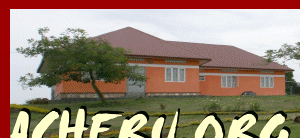| Circular -
June 2016 |
| We believe Acheru is a special place and whatever problems may be encountered in many ways it still sets the standard for the treatment and care of disabled children. I receive monthly statistics and sample case histories of children treated, but I recently asked for more information on the running of Acheru and day to day life there, so I hope the following will give you a better idea of life at Acheru, and will help you see beyond the statistics. |
Story of a typical day in Acheru: |
| Monday and Friday morning: Staff share a Bible message and dedicate the entire week through prayer. Then we go for a cup of tea after which the staff go to their respective places of work. |
| Joyce (administrator) deals with communication and meetings with partners, carries out general supervision of all aspects of Acheru. Collects drugs etc from Joint Medical Stores, promotes Acheru on local radio stations, and deals with administrative paperwork. |
| Betty and Robert (nurses) will start doing dressings. |
| Rose (social work) will talk to any new clients and record all their details before they are assessed by the physiotherapist or orthopaedic technician. |
| Johnson (orthopaedic officer) sometimes goes with patients to CoRSU for a plastic surgery clinic on Monday, or an orthopaedic consultation clinic on Thursday. At Acheru he deals with removal and replacement of casts, supports etc. |
| Physiotherapist: carries out physio sessions for all inpatients and outpatients, as well as assessment of new patients. |
| Harriet (community based rehabilitation) will have her files for home visits ready. She will have a particular area to visit to follow up the children we have treated, and also to look at children who may need to be referred to Acheru. |
| Margaret (matron) supervises cleaning of the outpatient department, and escorts Daisy to school. She then checks on any work needed at the guest house or the inpatient department. |
| Justine (cook) prepares meals for children, carers, and staff. She serves lunch to children and staff between 1 and 2. |
| Peter (groundsman) does mowing of the compound and collects the grass. On alternate days he digs and levels the flower beds. |
| Security personnel (Asuman, Martin, Julius). Two are on night shift, one patrols staff houses and another the guest house and main buildings. The one on day duty controls the main gate and records all visitors details. |
| Stephen (estates). Takes responsibility for grounds and buildings, and also does much of the driving. |
| Brenda (accountant). Receives cash paid by clients, prepares books of accounts, goes to the bank to make deposits of cash and salaries, does shopping at weekends and is responsible for the food store. |
| Juliet (teacher). Teaches classes and Bible stories in the morning, teaches songs, and organises games in the afternoons. |
| In addition to work done by the staff, there's often input from volunteers and visitors who may help with Bible studies, education, crafts, or medical care. Many former visitors keep contact with Acheru, and remain enthusiastic about the work. |
| "The family care we give to our clients is special; this is seen through the following: |
| 1. Good feeding. Our menu includes having milk and sugar in porridge, with an egg and a sweet banana served on alternate days. Lunch and supper of beans with fish, some groundnuts and posho. Beef, smoked fish, matoke and rice at weekends. |
| This makes our children and carers feel welcome, they are able to eat the same food (or better) that they would have at home. |
| 2. Special care. The staff creates an environment of love and care for the patients. The staff all feel their care can impact on a child's life. Through teamwork there is interdependence, with all staff taking responsibility for each individual child. |
| Each child requires a carer, usually the mother or another family member. If they have no one, then we go an extra mile by hiring a carer to look after a vulnerable child who may require urgent surgery. We don't want to see anyone turned away because they don't have a carer. |
| 3. Sharing Bible stories. Some clients develop talents for singing and preaching through sharing God's word with others and singing special songs. |
| 4. Little cost. Most other rehabilitation units charge for almost every service given; accommodation, casts, physiotherapy, dressings, hospital transport. We never do that; even a poor family can bring their family to the unit for treatment. |
| 5. Rehabilitation. Most health units just give treatment and discharge a patient; some may be told to go back for review, but few really care whether they do or not. We may keep on clients for quite a time but even when they are discharged they receive home visits to monitor progress. Many clients say the home visits are a sign of responsibility, love and care. |
| 6. Continuous financial support. We can depend on funds to purchase food and medication and deal with any other financial needs. This strengthens our relationship with partners because we do not have debts. Therefore the funds you give us strengthens our relationship with partners. It ensures services are readily available and keep a good relationship with our partners. |
| We have tried before and failed to get visas to bring Joyce and Harriet to the UK, but we are about to submit fresh visa applications. If successful, we intend that they will be here late July/early August, and we hope there will be opportunities to meet as many of you as possible. We hope to have more news soon. |
Brian Dorman |



